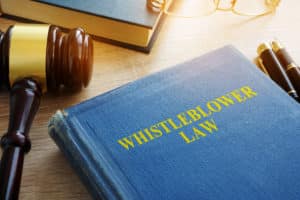Under the False Claims Act, individuals with inside knowledge of fraud against the government may come forward with what they know and help the government prosecute the wrongdoers. The whistleblower gets a percentage of any money recovered in the lawsuit.
A successful claim starts with the whistleblower understanding the role of a whistleblower lawyer in the proceedings. The right attorney will have resources and knowledge to handle such a complex and nuanced situation from beginning to end. The whistleblower’s attorney has a substantial role in the process.
Meeting with the Whistleblower and Evaluating the Claim

Understand the role of the whistleblower lawyer during False Claims Act proceedings.
The whistleblower’s attorney typically begins by bringing the person in and getting to know him or her. The initial meeting often includes multiple lawyers, at least one paralegal, and the whistleblower. The lawyers learn what the whistleblower knows and from this information can determine what cause of action, if any, the person has to file a claim.
If a cause of action exists, the lawyers then evaluate the facts, documents, and evidence offered by the whistleblower and figure out how it fits with the False Claims Act or other whistleblower laws such as the Dodd-Frank Act, which deals with securities fraud.
The question the lawyers want to answer is, is there sufficient evidence to meet the standards applied by the federal courts? If so, the lawyers proceed to the investigation stage.
Investigating the Whistleblower’s Claim Thoroughly
Once a cause of action is established and the lawyers are confident that enough evidence exists to meet the courts’ threshold, a more thorough investigation ensues. The whistleblower’s lawyers should look at the facts and evidence and determine how to put the case in the best light to present to the U.S. Attorney and the DOJ.
The lawyers talk to witnesses, conduct research, and handle other aspects of a thorough investigation. At Newsome Melton, our attorneys draw upon their experience as former federal prosecutors. We have prosecuted cases under the False Claims Act on behalf of the government, and we handle our clients’ whistleblower claims the same way we managed the cases we pursued for the U.S. Department of Justice (DOJ).
Filing a Lawsuit Under Seal and Protecting the Whistleblower
After putting together and organizing the claim, the lawyers file it under seal with the U.S. Attorney and take additional steps to protect the whistleblower. Unlike most court cases, whistleblower claims under the False Claims Act do not enter the public record unless or until the government declines to pursue the case.
At this point, the lawyers prepare for a protracted battle. False Claims Act cases are lengthy and nuanced, and the other side is sure to launch a counterattack, often backed by massive legal firepower, to obtain a motion to dismiss or summary judgment.
Waiting for the Government to Decide to Intervene
Upon filing a lawsuit under seal, the lawyers then must wait for the U.S. Attorney to decide if it wants to intervene and take the lead role in the case. However, the waiting process does not mean passively standing by. The role of a whistleblower lawyer should be active during this stage, providing the U.S. Attorney with any information needed, flying in expert witnesses if necessary, and helping with the investigation in any way they can.
Supporting the Government During the Trial Phase
If the U.S. Attorney decides to take the case, the whistleblower and his or her attorneys move to the sidelines but continue to assist with the case in a supporting role. They help when needed by providing testimony, clarifications, and supporting documentation.
Continuing with a Private Lawsuit if the Government Declines
A chance always exists that the U.S. Attorney reviews the case and the evidence presented by the whistleblower and, for one reason or another, declines to pursue it.
If the U.S. Attorney elects not to intervene, the whistleblower and attorneys must decide if they want to proceed with the lawsuit without the DOJ. If they decide to continue with a private lawsuit, the law firm must take on all the associated costs, such as the investigation, hiring expert witnesses, and paying court fees.
For this reason, it is important for the whistleblower to choose the right attorney when deciding to come forward with a claim. For a False Claims Act claim to have the best chance of success, the whistleblower’s lawyer should have extensive financial resources as well as the ability and experience to handle this type of case.

